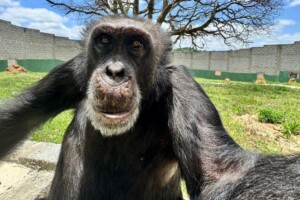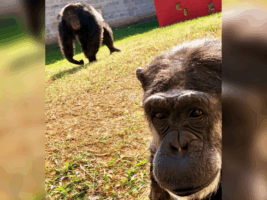GAP PROJECT AND MAX-PLANCK INSTITUTE
posted in
30
Dec
2008
AGREEMENT TO A PARTNERSHIP WORK IN IVORY COAST
GAP Project Spain (PGS) is beginning a partnership collaboration work with the renowned German Evolutionary Anthropology Institute Max-Planck, in Ivory Coast, where the majority of the chimpanzees has been disappearing in the last years.
The destruction of the forests, already spoken up by PGS and in our website, was the starting point for the work in the country. At Tai National Park there is hundreds of chimpanzees still in the wild and some of the groups had never been contacted by humans.
Between 1960 and 1980, around 100 thousand chimpanzees that lived in the country were reduced to an average of 10 thousand, and, after that, to an average of one thousand. The project proposal signed by both institutions – which is being coordinated in the field by member of Spanish GAP, Dr.Soiret Keagnon, specialist in Tropical Ecology – is to know the culture and customs of these primates who still survive in the last protected forest area and also of other primates that are critically threatened to extinction, like Cercopithecus diana roloway, Cercocebus atys lumulatus and Piliocolobus badius waldronae, which lived in big groups in the jungles of the country and now are close to extinction.
GAP Project Spain (PGS) is beginning a partnership collaboration work with the renowned German Evolutionary Anthropology Institute Max-Planck, in Ivory Coast, where the majority of the chimpanzees has been disappearing in the last years.
The destruction of the forests, already spoken up by PGS and in our website, was the starting point for the work in the country. At Tai National Park there is hundreds of chimpanzees still in the wild and some of the groups had never been contacted by humans.
Between 1960 and 1980, around 100 thousand chimpanzees that lived in the country were reduced to an average of 10 thousand, and, after that, to an average of one thousand. The project proposal signed by both institutions – which is being coordinated in the field by member of Spanish GAP, Dr.Soiret Keagnon, specialist in Tropical Ecology – is to know the culture and customs of these primates who still survive in the last protected forest area and also of other primates that are critically threatened to extinction, like Cercopithecus diana roloway, Cercocebus atys lumulatus and Piliocolobus badius waldronae, which lived in big groups in the jungles of the country and now are close to extinction.
It\’s interesting to mention that Tai National Park, apart from stable primates groups, owns the unique archeological site of non-human primates in Africa, which dates from 4.300 years and presents tools and food remains of what had been consumed in those times.
Apart from getting to know in depth the biodiversity of the area, this work aims to turn to park to be declared Humanity Patrimony. This was achieved a few years ago in Congo with Virunga Volcano Park, where the gorillas of the mountains live. And it is believed that this helped to avoid their disappearance.

 Español
Español
 Português
Português








